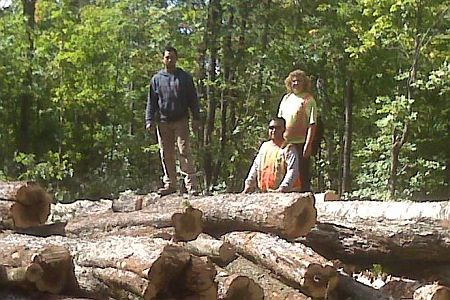A northeastern Ontario First Nation community is aiming to crack the biomass market.
Nipissing First Nation, just west of North Bay, has unveiled plans for a small wood pellet mill with a target of producing 24,000 tonnes of material annually.
Together with their big business partners, Gemini Power Corporation, the Nipissing band is developing plans for a small-scale pellet manufacturing plant at a site being prepared this winter.
Gemini is a private renewable energy company focused on partnerships with First Nations to develop wind, hydro-electric and biomass projects. If the project obtains proper funding and approvals, an estimated 20 jobs could be created. The wood supply is readily available through a couple of operators on First Nation land. The community intends to develop a marketing plan to determine local distributors' interest.
Nipissing’s Richard Rowe, the natural resources manager, said the First Nation already operates a small licensed forestry company on First Nation and area Crown land.
"We’re trying to maintain control of our own destiny and we know the supply exists for this pellet mill," Rowe said.
They’ve experienced some ups and downs but are starting to find a niche in training residents in harvest operations to supply fire wood for community elders and other off-reserve clients.
"There’s an opportunity to expand and get better at what we do," said Rowe.
They are starting with a foundation that includes a cable skidder, some chainsaws and a safety-trained workforce.
Gemini and the band are still meeting over financing, said Rowe.
The big challenge is determining whether to buy or lease the very specialized equipment that is needed, such as processors, grinders and debarkers.
With money from a government First Nations capacity-building plan, the intent is to develop machinery training programs this year with a long-term goal of working with educational institutes to create a skilled workforce on the reserve.
Rowe is hopeful the pellet operation could be working by August once plant construction begins this spring. "We’re in a good position to be up and running by 2010."
The bigger plan in the future is a combined heat and power plant, capable of producing 10 megawatts that could supply green energy to the Ontario grid and also produce back-up power for the new North Bay Regional Health Centre, now under construction.
But that project is in limbo due to the feed-in tariff rates of 13-cents-per kilowatt. It doesn’t make it viable enough for this larger project to proceed. Nipissing would need at least 16 cents.
Another issue is wood supply for this much larger scale operation. The province’s wood tenure model is unclear and it isn’t known what will be available once a competitive wood supply bidding process is carried out next year.
Rowe was encouraged by Minister of Northern Development, Mines and Forestry Michael Gravelle's comments that special consideration on future underutilized wood allocation will be given to business that forge partnerships with First Nations.
"We’re trying to build capacity and become self-sufficient and that certainly helps."
www.nfn.ca
www.geminipowercorp.ca




